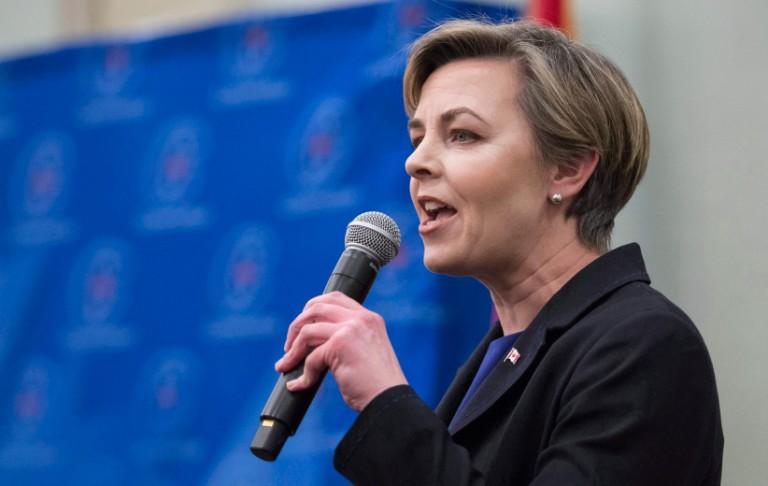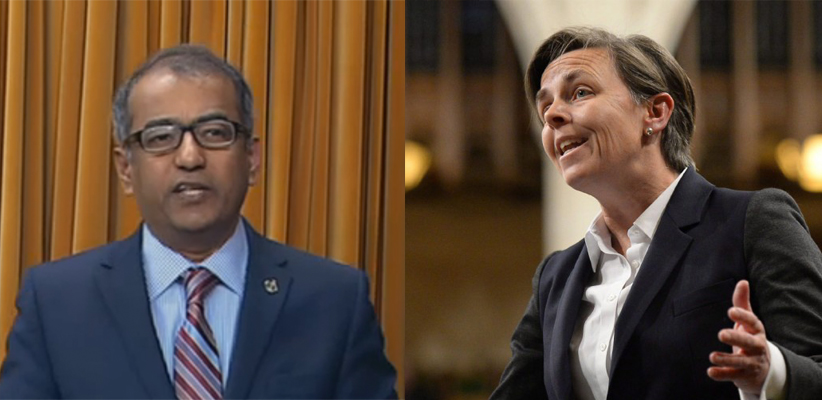The race to the political bottom
Conservatives are in full Trumpian seizures about M-103. But the party doesn’t have a monopoly on toxic rhetoric.

Candidate Kellie Leitch addresses a Conservative Party leadership debate Monday, February 13, 2017 in Montreal. (Paul Chiasson/CP)
Share

It should not have been a surprise. In the deepest part of the Pacific Ocean, the Mariana Trench, scientists recently discovered “extraordinary” levels of toxins inside sea life. According to a study by Dr. Alan Jamieson, PCB levels in life forms were “fifty times more contaminated than crabs from paddy fields fed by the Liaohe River, one of the most polluted rivers in China.” The belief that the far-flung depths of the ocean, 10 km below the surface, are somehow still wild and untouched has been shattered. The deeper down you go, the more poisonous things get.
As it turns out, Dr. Jamieson’s work may as well have applied to the current political climate. It’s hard to think of a time when the political discourse has been more toxic, when the race to the bottom more apparent. Those who blame Donald Trump for contaminating the partisan waters make a compelling case: his enthusiasm for crass personal attacks is rivalled only by his bizarre fidelity to falsehoods. Does he really believe there were three million fraudulent votes? Could he seriously suggest that the so-called “fake news” media colluded—in a secret room—to suppress what would be the biggest election fraud story in American history? Winners don’t usually demand a recount, but we may see that yet. Still, to blame Trump alone for the coarsening of the political environment is like blaming Darryl Sittler for the Leafs’ long losing streak: it’s been a group effort. Democrats have their own basket of deplorable episodes to sift through.
The Canadian contribution to the toxic political climate change has been notable, especially during the debate in Parliament over the issue of Islamophobia. What began as a well-meaning bit of political posturing has turned into a risible display of willful distortions, fear mongering and stereotyping. But let’s start at the top.
Back in December, a Liberal MP named Iqra Khalid moved a motion, M-103, to “condemn Islamophobia and all forms of systemic racism.” It pitched for some research on reducing racism and collecting data on hate crimes. On the surface, harmless enough. After all, a motion is not a bill. It’s not binding in any way, merely an initiative from a private member to raise awareness and take some action on a pertinent issue. In parliamentary terms, it is the equivalent of putting an idea in the work suggestion box that might be read out at a human resources meeting and maybe get a volunteer program started. Fair enough.
The trouble started, however, with the weird sense of déjà vu. Back in November of 2016, NDP Leader Tom Mulcair introduced a similar motion that also condemned all forms of Islamophobia. Though there had been concerns from some Conservatives that the motion might try to limit free speech or fair criticism of radical Islam, the motion eventually passed with unanimous support. Unanimous support. So, why the need to bring another motion forward? It is reasonable to suggest that this has as much to do with raw politics as it does with good intentions. The Liberals have been watching the Conservative leadership race convulse over Kellie Leitch’s Canadian values test campaign, her immigration ideas ripped quite openly from the pages of the Donald Trump playbook. Leitch was accused by candidates like Michael Chong of playing “dog whistle politics,” inciting anti-Muslim sentiments and fears. It has been one of the dominant issues of the Conservative race and Motion 103 has trapped Conservatives into a deeper, more divisive debate about inclusion and tolerance.
MORE: Read Kady O’Malley’s frequent Manning Conference dispatches here
Instead of simply condemning Islamophobia and moving on, the debate became a litmus test for caving into politically correct thinking. The details of the motion got lost as fears about restrictive blasphemy laws and the acceptance of sharia law spread. Still, it was not a burning issue until the night of January 29, 2017, when 27-year-old Alexandre Bissonnette walked into the Islamic Cultural Centre of Quebec City and massacred six people, wounding 19 others. Suddenly, the motion on Islamophobia moved from the back benches to the front pages.
Let’s just pause here to remind ourselves that the only massacre that has ever taken place in a mosque in North America happened in Canada. This is very much our problem and it has infused the M-103 debate, and the issues of hatred and racism in Canada, with a new and frightening relevance. Condemnation of hatred is not a zero-sum game. We must denounce the unique and specific terror at the Quebec mosque even as we condemn the imam who preaches horrific anti-Semitic sermons at a mosque in Toronto. It is not about choosing one nemesis, but acting against both.
Still, in the weeks after Canadians of all political parties came together to condemn the massacre, M-103 became a point of division. Khalid received countless threats and insults, many of which she read out in Parliament. It was distressing to say the least. Nonetheless, that did not lead to unanimous support for her motion. Conservatives asked her to remove the word Islamophobia and make it more inclusive, but she refused. The politics got ugly. Of the Conservative leadership candidates, only Michael Chong has said he would support the motion. The rest have refused, yanking the Conservative party further to the right during a leadership race that is trying to redefine the party as open to more Canadians. In the wake of a mass killing of Canadian Muslims practicing their freedom of religion, is it really that hard to condemn Islamophobia?
Not for Patrick Brown, the leader of the PC Party of Ontario. When the provincial Liberals introduced a similar motion at Queen’s Park, perhaps hoping to trap PC leader in the same quagmire, he had none of it. Immediately he announced he would support the motion. I asked him why. “Hate is hate,” he said simply. That ended the discussion and the motion passed unanimously. Why Brown’s former federal colleagues did not follow that simple road is anyone’s guess. But now, as they gather for the Manning Conference in Ottawa to hash out their future, they are in full Trumpian seizures about the issue, and it is dragging them down to the political depths. But there is someone who went even lower.
It turns out, the surprise winner in the race to the political bottom is a Liberal MP named Chandra Arya. In the midst of the debate about motion 103, the Nepean MP chose to go down to the Marianas trench of political poison. “The recent killings of Muslims praying in the mosque in Quebec City is not an accident,” Arya intoned, as if solemnity might somehow lend gravitas to the reckless vapidity of his forthcoming statement. “This is the direct result of dog-whistle politics—the politics of fear and division.” The “direct result,” he said, of “the elements who championed charter values, niqab ban, barbaric cultural practices tip-line — all targeted at Canadian Muslims.” Only later, when asked, did he name the PQ and the Conservative party by name.
It was a breathtaking statement. Before police have concluded what really motived Bissonnette—charged with six counts of first degree murder and five counts of attempted murder—Arya put the “direct” blame on Conservatives and the PQ. As if they somehow condoned and directly motivated the killer. Scoring political points on the murder of six Canadians is about as toxic as it gets. If there was ever a moment for an MP to apologize, this is it.
Leadership matters and leaders have a responsibility not to normalize hate, or bigotry, or cheap scapegoating. Leaders ought to be calm during hysterical times, to force details into discussions and not turn everything into a cheap slogan. Leadership means keeping a sense of proportionality. We don’t see a lot of that right now. This week, at the giant CPAC conference for Conservatives in the U.S., Donald Trump’s chief advisor Steve Bannon said we are entering a “new political order.” What that will look like is still anyone’s guess, but all signs so far point to descent into divisiveness. In the midst of this, Canada is being held up in the international media as an example of sobriety and reason. But look more closely. That too is proving to be a convenient delusion, as the debate about Islamophobia revealed. You can’t keep throwing poison into the political ocean and expect it to remain pure.